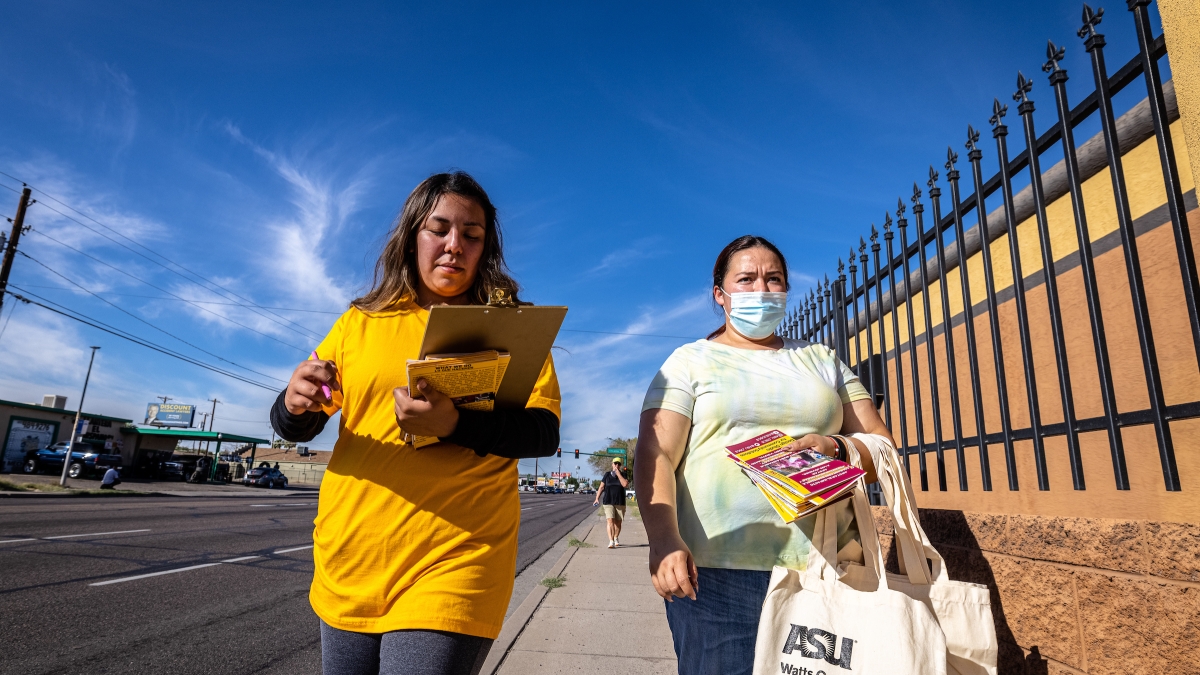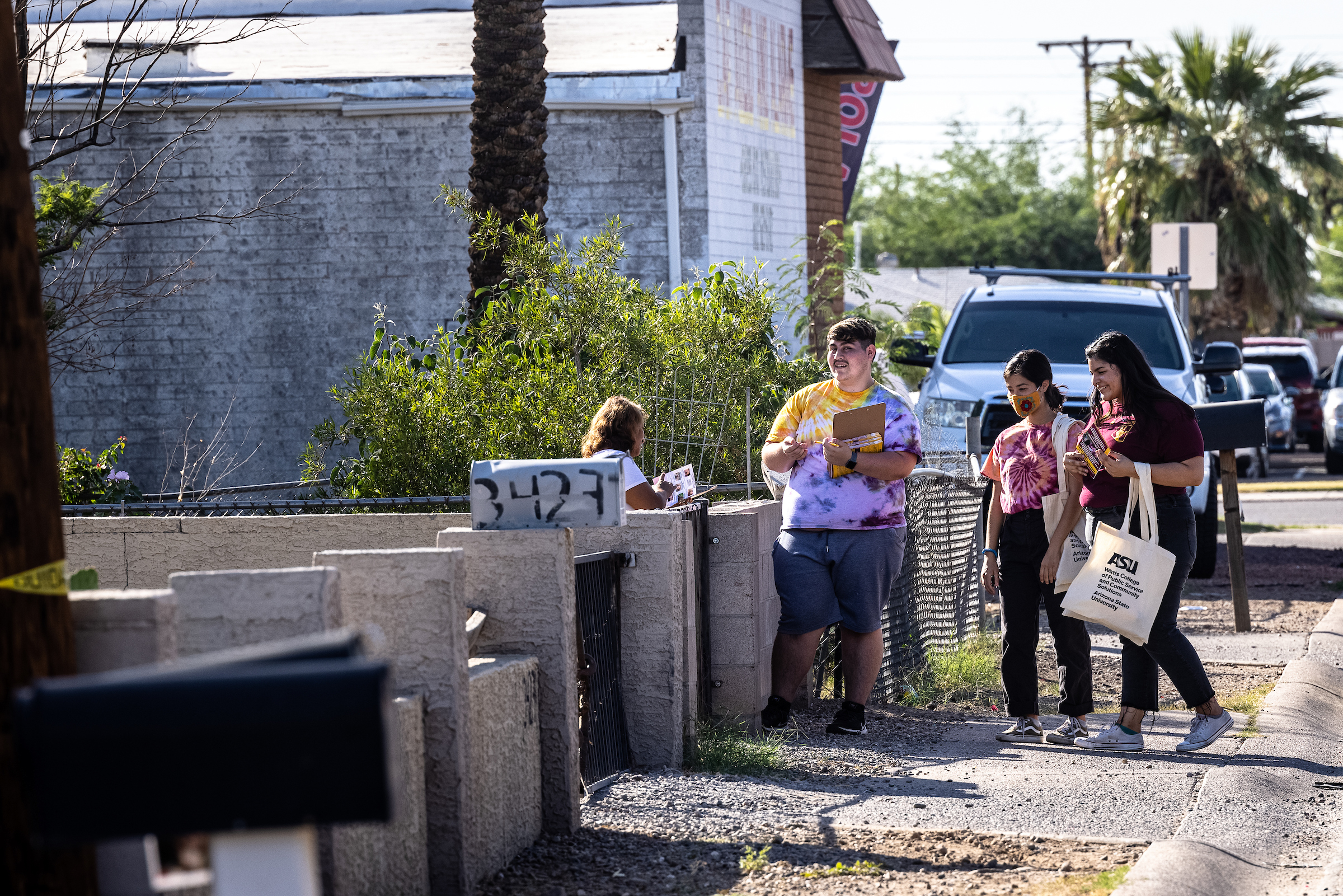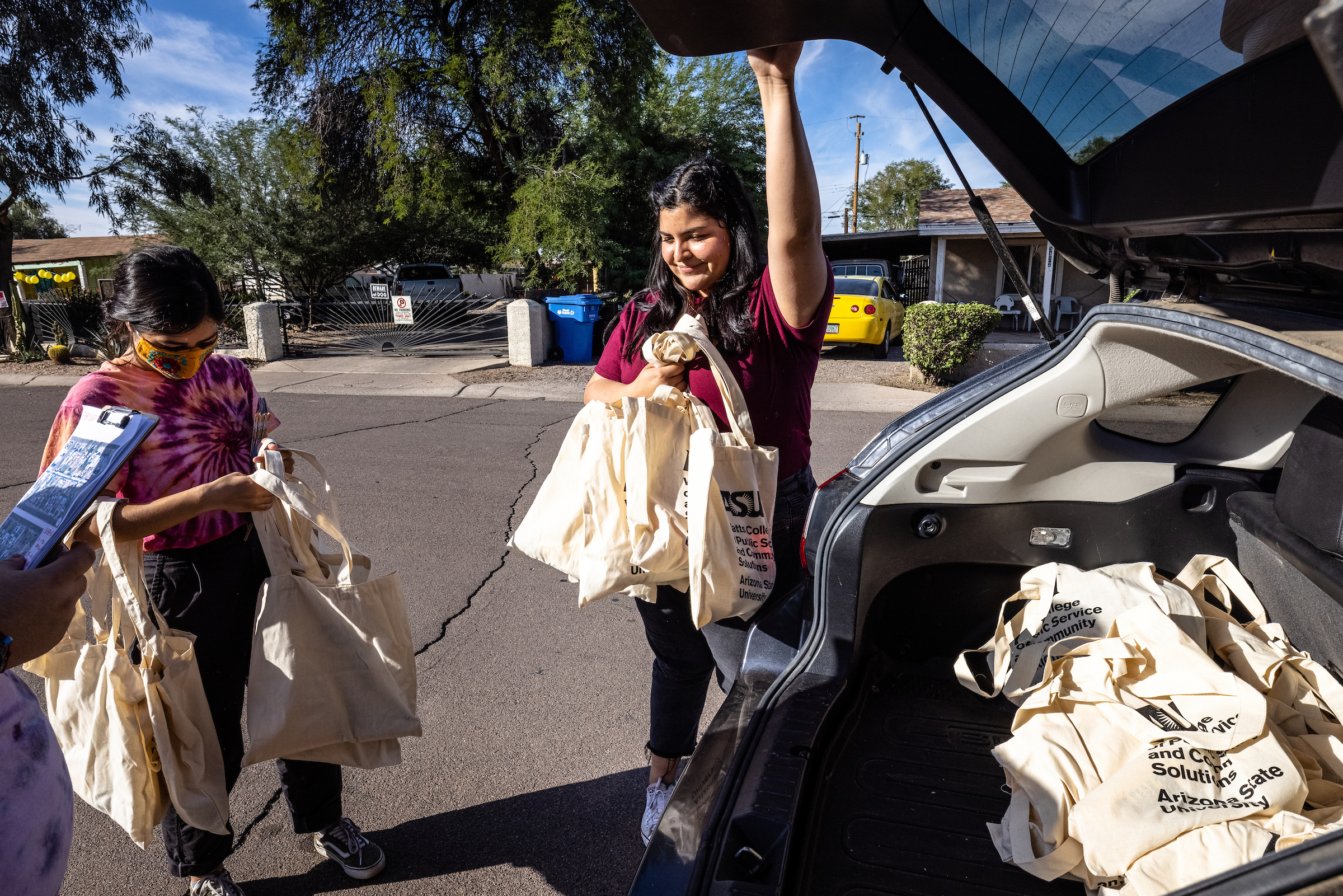ASU One Square Mile Initiative building connections in Maryvale

On a hot Saturday afternoon this fall, Wendy Ruiz knocked on the door of a house in the Maryvale community in Phoenix.
The resident opened the door and chatted politely for a while, and then Ruiz handed over an ASU tote bag filled with school supplies before waving goodbye and moving on to the next house.
Ruiz, a student at Arizona State University, was going door to door in Maryvale to spread the word about how residents can get free internet in their homes.
Like many of the neighbors, this one was skeptical.
“They think it’s too good to be true,” said Ruiz, who is a student worker for the One Square Mile Initiative, an ASU program that has spent three years working closely with the Maryvale community.
But that doubt is why the team from ASU walks the neighborhoods in Maryvale every month, according to Allison Mullady, senior program manager for the Design Studio for Community Solutions, which houses the One Square Mile Initiative.
“We’re trying to build relationships,” Mullady said. “A successful day for us would be to talk to as many people as we can.”
During the pandemic, the switch to remote learning revealed an alarming problem: Many households in Maryvale did not have the wireless internet needed to connect their kids to digital schoolwork. Some families had discounted internet whose broadband couldn’t handle the online assignments or multiple kids in one house. Others had no internet at all.
Video by Ken Fagan/ASU News
So the One Square Mile Initiative and the University Technology Office at ASU facilitated a pilot program for free Wi-Fi for homes in the Isaac Elementary School District in Maryvale.
Now, the One Square Mile Initiative teams are spending one Saturday a month knocking on doors to tell people about the free internet — and dispel doubts.
“To do that, we want to bring something, so we have school supplies we’re giving out, and that’s our opening to see if there are kids in the house,” Mullady said.
“With the initiative with the UTO, this whole neighborhood can have access to the free Wi-Fi, so we’ve been talking to each household to see if they have internet access, if they want it and information on how they can do that.”
Ruiz is one of four student workers for the program who are graduates of Maryvale High School.
“I know that a lot of people need that help from institutions, and I’m glad I’m able to be a part of that,” she said.
“I know many people do not have the financial means to get high-speed internet or the time to look for it. Getting that bill out of their way can help them focus on the most important things, which is school and work.”
A team from the One Square Mile Initiative goes door to door in the Maryvale community on a Saturday in October. They are (from left) Manuel Elizalde, a second-year public service/public policy student, program coordinator Mariya Bahrenburg and Kimberly Medina Rios, a second-year biomedical student. Photo by Charlie Leight/ASU News
Connecting providers
If Maryvale was a municipality, it would be the eighth-largest in Arizona. The collection of villages in southwest Phoenix has 230,000 people — with 44% of them under the age of 24, according to the One Square Mile Initiative.
The Maryvale initiative is the main project of the Design Studio for Community Solutions, in the Watts College of Public Service and Community Solutions at ASU.
The Design Studio was created in 2018 with the $30 million naming gift from Mike and Cindy Watts, founders of Sunstate Equipment Co.
The Watts family has fond memories of living in the working-class community of Maryvale in the 1960s. Mike and Cindy met at a Maryvale High School graduation party and went on to grow their equipment-rental business into a thriving enterprise. They wanted their gift to revitalize a community that is now struggling with poverty and crime.
Maryvale has a median household income of less than $37,000, compared with about $70,000 for Phoenix overall.
The One Square Mile Initiative is meant to concentrate focus in one area.
“I like to think of us as a kind of integrator,” said Erik Cole, director of the Design Studio for Community Solutions. The initiative works to connect nonprofits and services that already exist in the community with different units at ASU.
“We’re not necessarily going to be service providers, but we might put service providers together for an innovative approach,” he said. “It’s working across divisions and siloes.”
Among the accomplishments over the past three years, the studio has:
- Connected AmeriCorps VISTA workers from the Office of Gender-based Violence to different Maryvale initiatives. One of the VISTA workers is partnering with Chicanos Por La Causa to create a culturally responsive financial empowerment program.
- Partnered with ASU’s Global Launch to offer a remote Teaching English as a Foreign Language certificate program in Maryvale.
- Established a working group with several ASU units and the Phoenix police and streets departments to produce a report on pedestrian safety.
- Set up the Maryvale Youth Provider Network, a monthly meeting of leaders and staff from youth service organizations to support young people in and out of school.
- Facilitated more than $200,000 in grants to several Maryvale-focused programs, including a social justice club at Maryvale High School, a youth development program in the Cartwright Elementary School District and a family well-being project with Valleywise Health.
Kimberly Medina Rios (right), a biomedical medical major who is a student worker for the One Square Mile Initiative, gets ASU tote bags filled with school supplies as she prepares to go door to door with program coordinator Mariya Bahrenburg. Photo by Charlie Leight/ASU News
Moving at the speed of trust
Cole said that the most important goal for ASU in Maryvale is listening.
“One of our main tenets is that we don’t want to show up in a community or neighborhood for the first time talking about ourselves and what we do,” he said.
“We want to understand and really listen and learn.”
So over the past three years, the Design Studio held a series of community conversations in English and Spanish as well as interviews with many key stakeholders that will be used to pinpoint priorities.
Besides the four student workers who graduated from Maryvale High School, the studio also hired two “community champions,” people who live and work in Maryvale, as consultants.
“Having that perspective is critical,” Cole said. “A lot of what we do is take things back to the community to try to understand what that community voice looks like.”
Mullady said having the Maryvale students and community champions is critical when going door to door.
“It’s helpful in trust building because they know the community, they know what’s appropriate and what’s not appropriate and they know how to approach people to understand their goals and dreams,” she said.
When the Design Studio interviewed residents in Maryvale, it included a wide variety of people — city government workers, activists, health care providers and mothers who run the block watch, among others. The results revealed a wariness.
“I would say there’s a lack of expectation for institutions, that we will actually follow through,” Cole said.
“We’re a massive entity, and sometimes folks don’t know how to plug in. And this is a community that’s the first or second generation in the U.S., and there’s significant trauma from the last 10 to 15 years of anti-immigration law enforcement and also policy.”
It was like, ‘Who are you guys and what do you want?’ And we totally get that. That’s why building relationships within the community — even when you’re from the community — takes time. We move at the speed of trust."
— Rosie Espinoza, a community champion for the Design Studio for Community Solutions
That’s why a personal touch helps. Ruiz, who is majoring in business management with a minor in political science, is happy that she’s in the first group of student workers who are graduates of Maryvale High School.
“When you grow up here, you really feel connected with all the people around you, just because you share the same values, traditions and culture,” she said.
“So the moment you branch out, you feel the necessity to give back, because they’ve given so much to you. And now being able to give back is very fulfilling.”
Rosie Espinoza is a community champion for the Design Studio and works as a wellness advocate at an elementary school in Maryvale, where she lives. She was on one of the teams that went door to door recently and noticed the polite hesitation from the residents.
“It was like, ‘Who are you guys and what do you want?’ And we totally get that,” she said.
“That’s why building relationships within the community — even when you’re from the community — takes time. We move at the speed of trust.
“So we’re out here explaining who we are, what we’re doing and that we don’t want anything from them.”
Although building trust takes time, the urgency of pandemic required fast action.
“When the pandemic started, we were concerned about whether people would have access to information that was culturally appropriate and in the right language,” Cole said.
“Maryvale is predominately Spanish but also has a large refugee population.”
Besides the internet initiative, the studio responded in several ways:
- Sending regular email updates highlighting resources such as free COVID-19 testing locations, jobs, housing and rent support, plus remote learning resources.
- Setting up COVID-19 testing sites, including the first community-based site for ASU’s saliva testing. The studio supported ASU and the state with logistic advice, community outreach, broadcasting the availability of testing in English and Spanish, and on-site Spanish-language interpreters.
- Providing information about vaccines to the Hispanic community in response to a request from the Isaac district.
- Distributing with Watts College 2,500 personal protective equipment items to community agencies in Maryvale.
“We don’t provide the vaccines or the testing setups, but we can make those connections to make sure the professionals tailor their responses to the community,” Cole said.
Looking ahead, the studio plans to focus on pedestrian safety and eviction-prevention resources, in addition to continuing community conversations.
And walking the neighborhoods.
“There’s no substitute for that kind of face-to-face engagement,” Cole said.
“It’s relationship building — doing what we say we’ll do.”
Top photo: Wendy Ruiz (left), a second-year business management major at ASU, and Karolina Arredondo, a community champion in the One Square Mile Initiative, go door to door meeting residents near 35th Avenue and Encanto Boulevard in the Maryvale community of Phoenix on Oct. 23. Photo by Charlie Leight/ASU News



